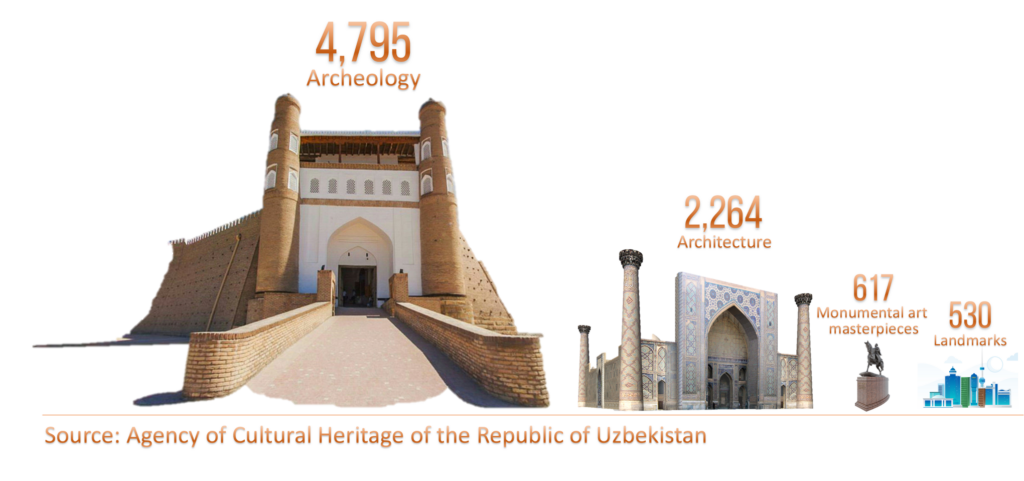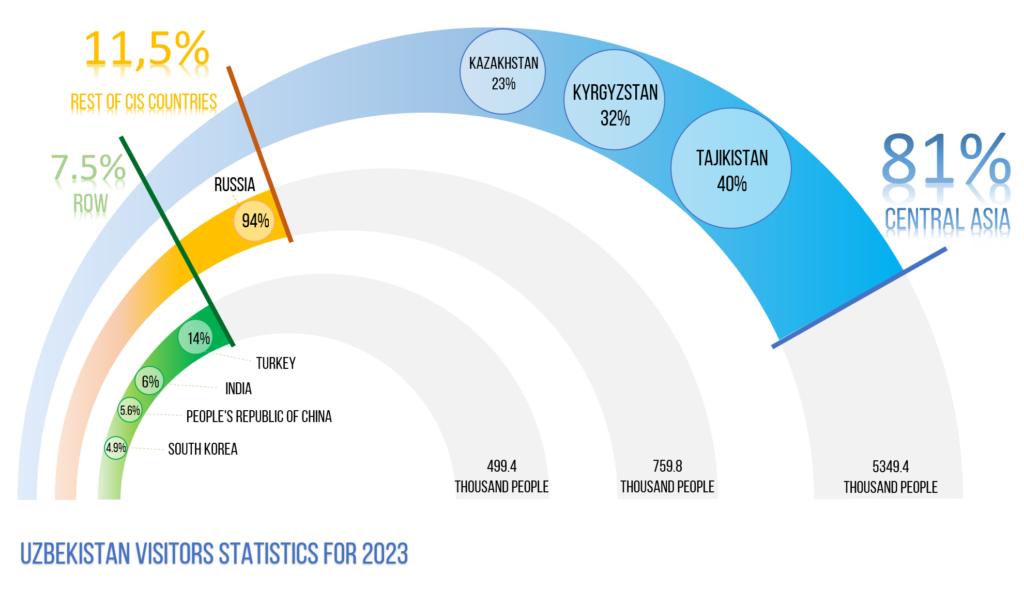NEW MODEL OF TOURISM FOR THE NEW UZBEKISTAN
Uzbekistan is the only country in Central Asia that borders every country in the region. Uzbekistan is one of only two countries in the world that does not even have neighbours with access to the sea (the other being Liechtenstein). The oldest cities in Uzbekistan are over 2750 years old (Samarkand, for example, is as old as Rome and is one of the oldest cities in the world). Uzbekistan is the only country in the world where more than 90% of the cars are Chevrolets, and more than half of them are white.
These are not all the amazing facts that tourists will encounter while travelling around the country. The Republic of Uzbekistan has made remarkable progress in structural transformation, improving the investment climate and creating a freer, more transparent and level playing field for entrepreneurs, and has improved its position in international rankings on investment climate and doing business, despite the negative impact of the COVID-19 pandemic.
Since 2016, more than 100 regulatory legal acts have been adopted to develop the tourism sector in Uzbekistan, with a number of state programmes have been adopted, which have demonstrated their high efficiency. Large-scale measures and reforms in the development of tourism infrastructure, diversification of tourism products of different profiles have led to the dynamic attraction of tourists to Uzbekistan.

The main problem of tourism development is the insufficiently developed system of transport aviation logistics, insufficient coverage by flights of promising tourism markets. Although in recent years systematic work has been carried out to increase the number of flights by foreign airlines, 6 new national airlines of Uzbekistan have been opened to serve foreign and domestic flights. In the current conditions of globalisation, Uzbekistan is trying to provide full access to modern interactive opportunities and remove all existing technical barriers. Cardinal liberalisation of the visa regime (visa-free regime with 93 countries, electronic visas with 57 countries, transit visas with a stay of 5 days for citizens of 53 countries) allowed for a short period of time to ensure a cardinal, essentially annual growth of tourists in the amount of 30% per year in the period before the pandemic.
Visitors from neighbouring countries accounted for the largest share of visits to Uzbekistan in 2022, with 81% of the total tourist flow. At the same time, the most significant increase in flows from other CIS countries in 2023 will come from Russia (by 12% compared to 2019), despite the fact that tourists from Russia already account for more than 80% of the total tourist flow from CIS countries outside Central Asia. Among non-CIS travellers, Uzbekistan is most popular with citizens of Turkey, India, South Korea, Germany, Italy and US.

Uzbekistan has a huge potential and is gaining its worthy place in the international market of tourist services. Today, priority is given to the development of ecological tourism, for which the country has excellent conditions – all four seasons are expressed and unique natural areas from mountains and deserts to forests and lakes are presented. The national system of protected areas includes 8 nature reserves, 2 nature parks and 1 national park, 6 natural monuments, 11 wildlife sanctuaries, more than 50 water protection zones. The only place that modern Uzbekistan cannot offer is the sea. Uzbekistan’s Aral Sea is a clear example of man’s negative impact on nature. In order to draw the attention of the international community to this problem, special routes have been developed where tourists can visually see the consequences of human impact on the environment. There is also a strong emphasis on developing measures to reduce the negative impact of human activity on the country’s ecology.
Uzbekistan also emphasises the development of rural, agrarian, extreme mountain and other types of alternative tourism. These destinations are attracting audiences that are moving towards event tourism and the experience economy.
Traditional cultural tourism is also flourishing. The splendour of many historical monuments preserved since ancient times, their unique architectural style, which has survived hundreds and even thousands of years, continues to amaze the whole world. Most international tourists come to Uzbekistan to see with their own eyes the wonderful works of art created by our ancestors, to feel their greatness and to immerse themselves in the world of legends about great amirs, invincible warriors, brilliant scientists and philosophers. More than 7,400 tangible cultural heritage sites are under state protection.
Tourism is the most sensitive sector, reacting instantly to events in the world, from natural disasters, political and economic crises to epidemics and artificial intelligence. The tourism industry is currently undergoing global and fundamental changes that are fundamentally altering traditional views of the industry. These include the acceleration of digitalisation, the introduction of information technology and the use of new interactive methods to enhance the attractiveness of tourist destinations. For example, artificial intelligence has become an objective reality in tourism. Already, such artificial intelligence algorithms can generate a variety of tourism products and programmes for different categories of travellers.
Today, Uzbekistan is integrating new technologies and approaches into the tourism industry. For example, the night-time economy has huge potential to provide employment for the local community and additional monetisation of tourist services in the tourism industry. Every tourist is interested in making the most of their time in the country they are visiting, but not all countries offer such opportunities at night, such as round-the-clock visits to museums, entertainment centres and other attractions. Great results have been achieved in this area in Great Britain, Thailand, Japan and other countries with developed tourism, and we are adopting their experience and adapting it to our realities. Our country is also actively creating infrastructure for the development of inclusive tourism, and facilities for comfortable recreation and travel are being installed at tourist sites and cultural heritage sites for the physically challenged and disabled. In addition, in order to attract a wide range of foreign investors to the tourism industry, public-private partnership mechanisms are being used to stimulate the contribution of investment to the development of tourism infrastructure facilities.
In 2019, Uzbekistan entered the top 20 countries in the world that have achieved the greatest results in improving the business environment, ranking 69th out of 190 countries in the Doing Business 2020 ranking. Not resting on our laurels, we are continuing our steady development in this area.
by Shukhrat Isakulov, Doctor of Economics,
Head of the Transport Logistics Development Department of the Tourism Committee under the Ministry of Ecology, Environmental Protection and Climate Change of the Republic of Uzbekistan
